The 1st China Tax Law and Tax Lawyer Salon - Civil Code and Tax Law
On the evening of September 18, 2020, the "1st China Tax Law and Tax Lawyer Salon" was hosted by the Fiscal and Taxation Law Professional Committee of the All-China Lawyers Association and the Fiscal and Taxation Law Research Center of China University of Political Science and Law, and hosted by Beijing Hwuason Law Firm and Huashui College. It was held grandly in the Research Building of China University of Political Science and Law (Xuanxuan Road Campus). With the theme of "Civil Code and Tax Law", this salon invited nearly 20 leaders of competent departments, famous civil law scholars, tax law scholars, senior tax lawyers, etc. to participate in the discussion. There were also more than 50 lawyers, tax accountants, Teachers and students at the school and more than 6,000 people from all walks of life watched the simultaneous live broadcast online.

The picture shows the salon scene
At 18:30 on the evening of September 18, the salon was officially held. Han Xiutao, secretary-general of the All-China Lawyers Association, Liu Jianwen, president of the Fiscal and Taxation Law Research Association of the China Law Society and professor of Peking University Law School, and Yu Fei, dean and professor of the Civil, Commercial and Economic Law School of China University of Political Science and Law, delivered speeches. Professor Shi Zhengwen, Vice President of the Fiscal and Taxation Law Research Society of the China Law Society and Director of the Fiscal and Taxation Law Research Center of China University of Political Science and Law, served as the moderator.
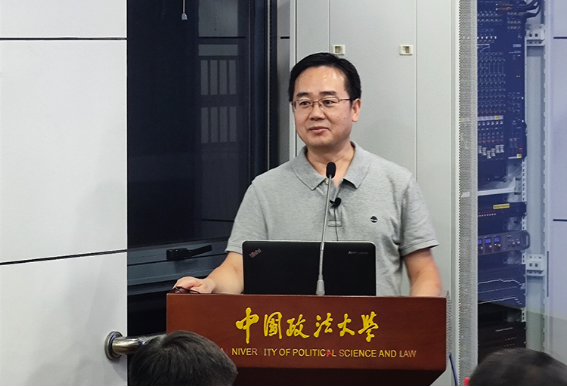
The picture shows Secretary-General Han Xiutao delivering a speech
In his speech, Secretary-General Han Xiutao highly affirmed the holding of this salon and expressed his appreciation for the attention paid to this salon by experts, scholars, lawyers, tax accountants, school teachers and students and other theoretical and practical people. He pointed out that among the 18 professional committees of the National Lawyers Association, the Financial and Taxation Law Professional Committee is one of the professional committees with the most organized activities and has played an important role in leading the development of the tax-related legal services industry. Several brand activities created and organized by the Financial and Taxation Law Professional Committee - China Tax Law Forum and Tax Lawyers and Tax Agents Forum, China Tax Lawyers and Tax Agents Summer Academy and "China Tax Lawyers Review", etc., have been successfully held for nearly 10 times and produced It has a profound impact and he hopes that the China Tax Lawyers Salon can continue to be held successfully for a long time. He further emphasized that taxation is a profile and reflection of a country’s economic activities. Lawyers engaged in tax law should pay attention to macro policies, including economic policies and tax laws and regulations. The promulgation of the Civil Code has an impact on my country’s basic legal systems, including administrative law. , criminal law, tax law, etc., all have a profound impact. The theme of this salon with "Civil Code and Tax Law" is very meaningful and forward-looking.
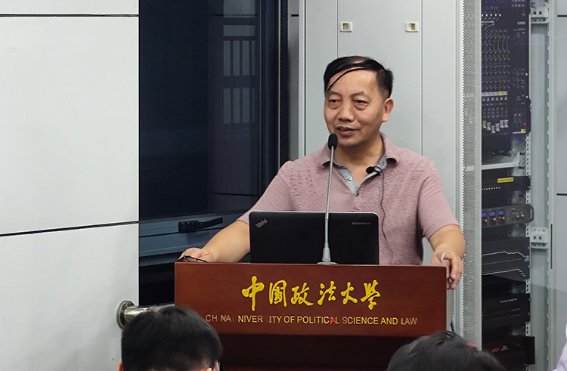
The picture shows President Liu Jianwen delivering a speech
In his speech, President Liu Jianwen believed that the Civil Code passed by the Third Session of the 13th National People's Congress is the first law named after a code in New China and is the result of the continuous improvement of the socialist legal system with Chinese characteristics. It marks the entry of our country into The era of civil code. Civil law and tax law are both laws that protect private property. One is horizontal protection, and the other is vertical protection. The protection of civil law alone is incomplete, and protection of tax law is also needed. The purpose of this salon is not just to simply discuss the relationship between civil law and tax law, but also to see the role of civil law in social life, and also to see the role of tax law in social life. At the same time, in terms of the connection between tax law and civil law, he emphasized that many concepts in tax law are borrowed from civil law, such as the right of subrogation, the right of revocation, the right of priority, etc. Therefore, in tax law, there are concepts such as "individual" and "unit" as taxpayers. , we should also learn from the concept of civil subjects "natural persons, legal persons, and other unincorporated organizations" in civil law, so as to organically combine tax law and civil law. He believes that after individual tax laws have been elevated to law, the compilation of the Tax Code is an inevitable trend. He hopes that more people who care about fiscal and taxation laws will devote themselves to the cause of fiscal and taxation laws and pay attention to and support the development of my country's fiscal and taxation laws.
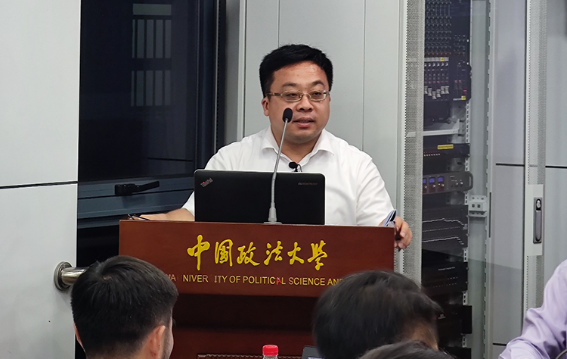
The picture shows Dean Yu Fei delivering a speech
In his speech, President Yu Fei believed that although Article 1260 of the Civil Code provides a relatively systematic and comprehensive provision on private rights, if this system of private rights cannot properly handle the relationship with public rights, its value will be lost. is limited. One of the public rights here is tax collection and administration power. The effective exercise of tax collection and administration power will undoubtedly promote and protect private rights; on the contrary, the disorder of tax collection and administration power will lead to the inability to protect the rights of civil subjects in the Civil Code. accomplish. Therefore, on the one hand, public rights and private rights may promote each other, but on the other hand, they may harm each other. Therefore, it is necessary to study the relationship between the two so that they can absorb and learn from each other.
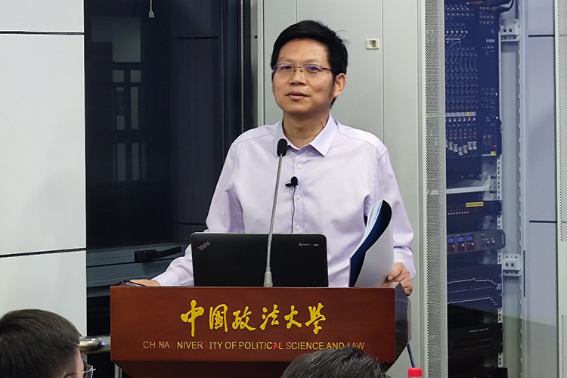
The picture shows Professor Shi Zhengwen presiding over the salon
As the host of this salon, Professor Shi Zhengwen introduced the theme of this salon and the guests to the participants, and expressed his gratitude to the guests for their support of the salon. He believes that studying and studying the Civil Code is a major event in the new era. Civil law is an encyclopedia of social life. Everyone’s life is closely related to civil law, and taxation is the price of civilization. Finance and taxation are the foundation and pillar of modern national governance. Taxation is the basis for protecting and improving people’s livelihood. Civil law is the protection of private property, but my country's Civil Code lacks basic principles on how the state taxes. If a country's taxing power can be exercised arbitrarily, private property will not be effectively protected. Therefore, how to coordinate the relationship between the Civil Code and the tax law after it is promulgated is an issue that the legal community needs to attach great importance to and study.
After the guests' speeches, the salon entered the keynote speech session. In the first unit, Yu Fei, Dean and Professor of the School of Civil and Commercial Economics of China University of Political Science and Law, Teng Xiangzhi, Director of the Fiscal and Taxation Law Case Study Center of the Chinese Academy of Social Sciences, and Tang Jieyin, Associate Professor of the School of Political Science and Law of the University of Chinese Academy of Social Sciences, delivered keynote speeches.
The theme of Dean Yu Fei's speech was "Construction of the Interpretation Theory of the Civil Code from the Perspective of Collaboration between Civil Law and Administrative Law." He pointed out that after the promulgation of the Civil Code, the discussion of legislative theory came to an end, and the next step was the construction of the interpretation theory of the Civil Code. He believes that the code is "Heaven" and its rules can come from any corner of the world, while the civil law issues that arise in practice are "Earth", and the connection between "Heaven" and "Earth" is how to use the Civil Code. Regarding every actual case in China, only Chinese scholars can solve this problem. This is why "China" can be added in front of the Civil Code. He pointed out that after China enters the period of interpretation of the Civil Code, the relationship between civil law and public law should be properly handled, especially administrative law and tax law, and the "contract validity and administrative law norms" and "identification of fault in torts" should be properly handled. Four issues including "Green Principles and Environmental Law Norms" and "Personal Information Protection and Public-Private Law Cooperation" will be analyzed in detail. He emphasized that the scope of civil autonomy is not determined by oneself, but is determined by public law and private law together. Nowadays, when there are so many administrative laws, regulations and rules, the extent to which this network of public law affects private law and the extent to which this impact is reasonable can enable public law to remain moderate when interfering with private law autonomy and market economic freedom. This is This is an issue that needs to be jointly discussed and resolved by civil law and administrative law.
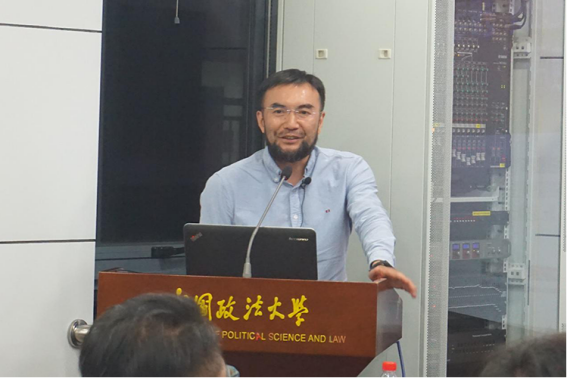
The picture shows Director Teng Xiangzhi giving a speech
The theme of Director Teng Xiangzhi’s speech was “Analysis of the Principles, Logic and System of Tax Law Certainty Issues”. He believes that the current large number of tax normative documents are essentially confirming and explaining the tax components of the tax law. How to explain the gaps in the tax law without breaking the legal principle of taxation is the difficulty, and in the process of solving this problem Full of intertwining civil law issues. In compound transactions, the tax authorities often only intercept fragments of the compound transaction to determine the tax subject, which is prone to confusion. Similar to financial leasing, sale and leaseback, etc., the purpose and means of the transaction should be viewed as a whole. He took the "Letter of the State Administration of Taxation from the Xiamen Municipal Taxation Bureau on the Response to Proposal No. 1112 of the Fourth Session of the 13th CPPCC" (Xiamen Shuihan [2020] No. 125) as an example of the identification of dormant shareholders' tax obligations. It is pointed out that the characterization of transactions in tax law should be based on the demonstration and civil and commercial law, that is, the evaluation of tax law is based on the evaluation of civil and commercial law.
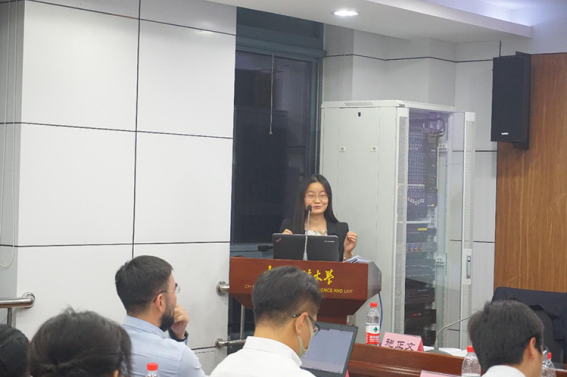
The picture shows Associate Professor Tang Jieyin giving a speech
Associate Professor Tang Jieyin gave a speech on the topic of "Private Law Autonomy and the Choice of Tax Basis". She believes that after a certain economic activity occurs, civil law focuses on the form of private law, while tax law pays more attention to the economic consequences, that is, tax affordability. When the private law form is consistent with the economic consequences, the tax law will have the same taxation result no matter what standard it is based on. Therefore, under normal circumstances, the tax law will use the legal form that has been recognized in the civil law to describe the tax constitutive facts. In cases where the form of private law is inconsistent with the economic consequences, such as the most typical trust, the tax law has its own unique value pursuit and normative purpose. Therefore, the tax law will be free from the constraints of civil law, independently describe the tax law facts, and directly evaluate the economic consequences. She believes that when the private law form is inconsistent with the economic consequences, the purpose of the transaction needs to be examined. If it is only for the purpose of obtaining tax benefits, the tax authorities can impose taxes based on the substantive taxation principle. Finally, she believes that the selection or innovation of transaction forms for commercial purposes should be allowed, and good-faith tax considerations should be recognized, so as to ensure the effective connection between tax law and private law.
After the keynote speech of the first unit, Liu Peng, deputy director of the Editorial Office of China Social Sciences Magazine, Li Meiyun, professor of the Civil and Commercial Law School of China University of Political Science and Law, and Zhang Chi, lecturer of the Law School of China People's Public Security University, made wonderful comments based on the speeches in this unit.
The second unit of the salon was led by Ye Shan, professor of Peking University Law School, Weng Wuyao, associate professor and director of the Institute of Fiscal and Taxation Law of the School of Civil and Commercial Economics of China University of Political Science and Law, He Yan, deputy director and associate professor of Fiscal and Taxation Law Research Center of Capital University of Economics and Business Law School, Zheng Yi, lecturer at the School of Civil and Commercial Economics at China University of Political Science and Law; Dong Gang, tax partner and director of the tax department at King & Wood Mallesons; Guo Yongmao, partner and director of the tax department at Haiwen Law Firm; director of the Financial and Taxation Law Professional Committee of the National Lawyers Association, Liu Tianyong, director of Hwuason Law Firm, and Shi Zhengwen, vice president of the Fiscal and Taxation Law Research Association of the China Law Society and director of the Fiscal and Taxation Law Research Center of China University of Political Science and Law, delivered keynote speeches.
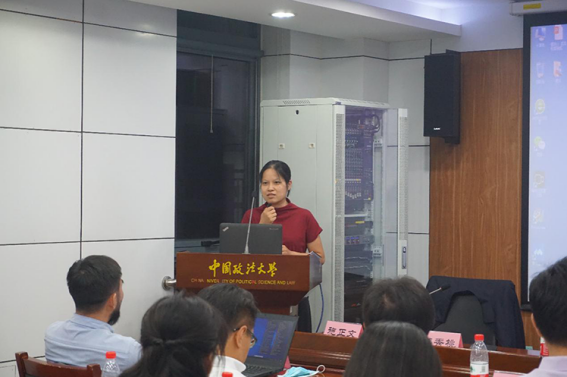
The picture shows Professor Ye Shan giving a speech
The topic of Professor Ye Shan's speech was "Coordination of the Contract System and the Value-Added Tax System". She pointed out that the taxable objects of VAT, that is, the "taxable transactions" stipulated in the "VAT Law (Draft for Review)", as well as the time when VAT liability occurs, how to draw on the relevant provisions of the Civil Law and obtain the balance between the two laws. The tacit understanding is an issue that should be paid attention to in the process of value-added tax legislation. She pointed out that it is necessary for those provisions in tax normative documents that are suspected of creating rules to be elevated to law. What kind of content should be written into law is the most useful reference that the Civil Code can provide in the process of value-added tax legislation. Regarding the issue of personal information protection, she believes that the promulgation of the Civil Code has put forward new requirements for the protection of the private rights of personal information. Therefore, in the process of revising the Tax Collection and Administration Law, how to determine the boundaries of tax authorities' compliance with their duties? And after the revision of the Personal Income Tax Law, how the Tax Collection and Administration Law responds to the surge in the number of individual taxpayers are all important issues facing the revision of the Tax Collection and Administration Law.
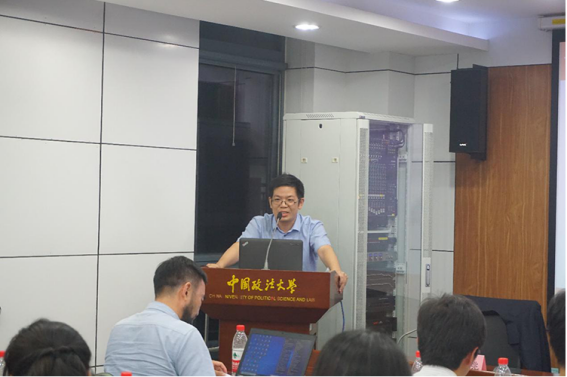
The picture shows Director Weng Wuyao giving a speech
The theme of Director Weng Wuyao's speech was "Coordination of property rights, contracts, marriage and family, inheritance system and income tax and property tax". He emphasized that both civil law and tax law are important components of the socialist legal system with Chinese characteristics. The normative objects of the two laws are identical, and the general legal principles derived from civil law also have corresponding applications in tax law. Therefore, it is necessary to consider the relationship between civil law and tax law. Coordination of tax laws. He believes that the newly established property rights objects in the Civil Code, such as collective land, sea area use rights, exploration rights, land management rights, residence rights, etc., are all closely related to the expansion of tax sources in the tax law. In addition, there is a linkage effect between the performance, preservation and termination of the contract and the creation and retroactive elimination of tax debts. From the perspective of tax types, as far as behavioral taxes are concerned, the act of entering into the contract occurs immediately, and the tax debt cannot be eliminated retroactively, while for income tax , property tax, if the corresponding economic consequences are restored to their original status, the tax debt may be eliminated retroactively, but at this time some restrictions are still needed to limit the abuse of rights to avoid taxes.
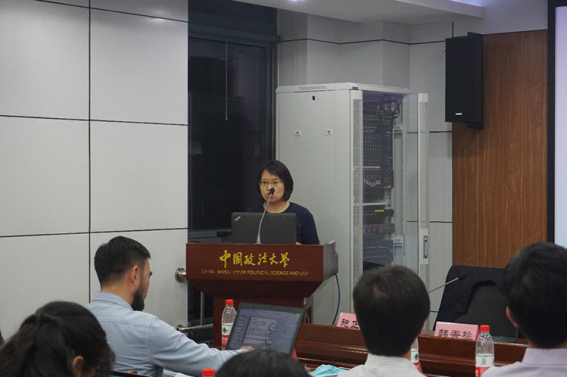
The picture shows Deputy Director He Yan giving a speech
The theme of Deputy Director He Yan's speech was "Coordination of the Civil Code and the Tax Recovery System." She first pointed out that there are three ways to realize tax claims from the civil legal system: the first is to extend the tax liability to a third party based on the prior civil legal relationship between the taxpayer and the third party; the second is the preservation system; The third category is the concept of "second-time taxpayer" in tax law. However, there are two difficulties in the civil recovery mechanism of taxes: First, the legal basis is vague in terms of substance. The "Tax Collection and Administration Law" has given the tax authorities the power to enforce enforcement, so tax authorities will be questioned if they recover taxes through civil channels; secondly, administrative litigation is a "people sue the official" procedure, which does not provide a A reverse structure in which tax authorities prosecute taxpayers. If civil litigation is used to realize tax claims, the structure of this procedure is actually mismatched. Typical problems lie in the distribution of the burden of proof and the assertion of third party rights. Based on this, she further pointed out that the crux of the above issues is that although there is a certain consistency in the methods, principles and balance of interests in realizing debts under public law and private law, and tax law can learn from some systems in civil law, tax debts have certain The key to solving the problem is how to understand and determine the "public" factor, how to take precedence over private rights, and how to coordinate public law debts and private law debts.
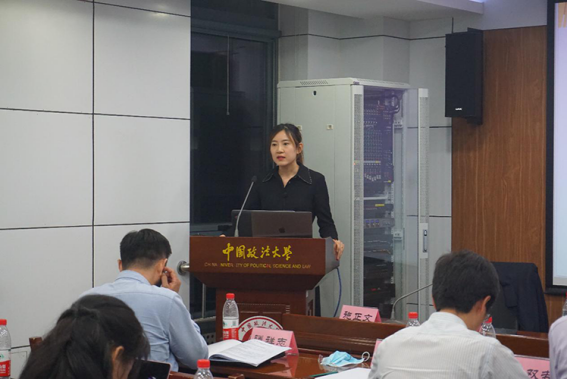
The picture shows lecturer Zheng Yi speaking
The topic of Lecturer Zheng Yi’s speech was “Protection of data, personal information and network virtual property from the perspective of coordination of civil law and tax law”. On the basis of introducing the U.S. tax law on virtual property taxation, she pointed out that big data has huge economic value in the current economic environment. In the transaction process of data and other virtual properties, economic changes between buyers and sellers will lead to the intervention of tax laws. . The tax law's taxation principle for virtual property is based on the interactivity of the virtual property with real property, and the specific taxation methods include withholding tax during the transaction or the third party providing tax-related information. She pointed out that the different attitudes towards the protection of data and personal information between the European Union's General Data Protection Regulation and the United States' Privacy Act are rooted in the different positioning of data in civil laws between Europe and the United States. The reference significance it provides for my country's tax legislation lies in the fact that my country's tax law The next development of China’s digital economy must be in line with the objective development status of my country’s digital economy on the one hand, and closely related to the positioning of the digital economy in civil law on the other.
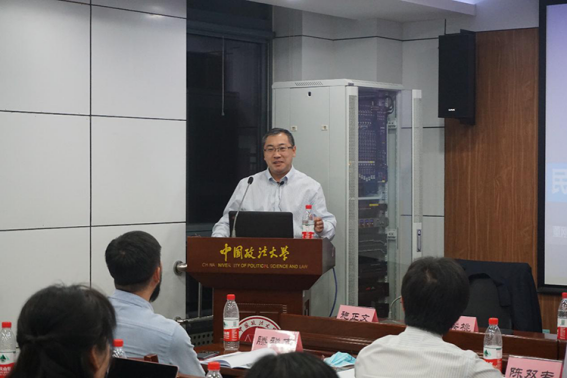
The picture shows Director Dong Gang giving a speech
The theme of Director Dong Gang's speech was "The Impact of the Civil Code on the Tax-related Service Industry". From the perspective of a tax lawyer, he expounded on how lawyers apply "civil law thinking" and civil law provisions to resolve tax issues using two cases: "Individual Tax Dispute between Small Shareholders Obtaining Compensation from Major Shareholders for Gambling Failures" and "Dispute over Applicable Tax Rates for New Energy Management Contracts" dispute. He pointed out that tax administrative law enforcement forms an administrative legal relationship, and the administrative counterpart can never form a complete parity with the administrative agency. Therefore, in most cases, the Civil Code cannot be a direct answer to controversial issues in the tax collection and administration process. However, many of these provisions have a fundamental impact on tax collection and can bring new business opportunities or challenges to the tax-related service industry. With the continuous progress of my country's tax laws and the continuous improvement of the tax system, tax lawyers will have greater room for development.
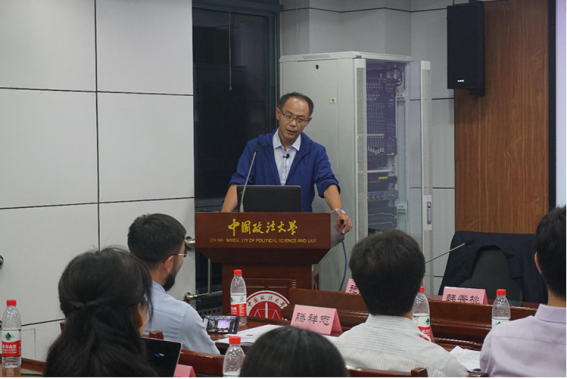
The picture shows Director Guo Yongmao giving a speech
The theme of Director Guo Yongmao's speech was "The Impact of the Civil Code on the Tax-related Service Industry". He pointed out that the unique advantage of tax lawyers in solving tax problems lies in their comprehensive vision of "tax + law". Where tax law rules are unclear, tax lawyers can explain the relevant rules based on legal principles and fight for the legitimate rights and interests of taxpayers. . Regarding the relationship between civil law and tax law, he pointed out that "tax" is rarely mentioned in the Civil Code, but tax law is inseparable from the Civil Code. The theoretical system of civil law helps tax professionals put forward professional suggestions for improving tax laws, and the corresponding results of the Civil Code can also be reflected in tax laws. For example, the Value-Added Tax Law (Draft for Comments) has changed the Finance and Taxation [2016] No. 36 The article "transfer of financial products" falls under the provisions of "provision of financial services", but "financial products" are juxtaposed with "services", "goods", "intangible assets" and "real estate" and are no longer considered part of "services". Finally, he pointed out that the theoretical system of civil law can help tax lawyers and judges gain ideas and resonance in trial work. He took the interpretation of standard clauses in Article 498 of the Civil Code as an example and believed that if the provisions of the tax law are unclear, the judge should follow be interpreted in favor of taxpayers.
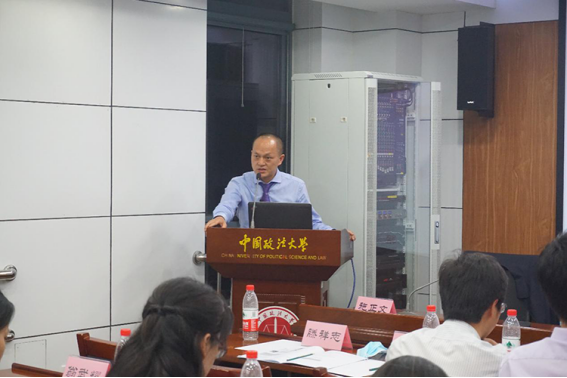
The picture shows Director Liu Tianyong giving a speech
The theme of Director Liu Tianyong’s speech was “The Impact of the Civil Code on the Tax-related Service Industry”. He pointed out that the promulgation of the Civil Code has brought new opportunities to the entire tax-related service industry, including lawyers, tax accountants, certified public accountants and other intermediaries. The reason is that the Civil Code plays a fundamental role. 》The rules have changed, and civil law is the basis of tax law. Therefore, in the future, more new opportunities will arise in tax dispute resolution, tax-related consulting, tax planning and other businesses. He believes that when the Civil Code is implemented, subsequent judicial interpretations have yet to be issued, and conflicts between civil law and other laws objectively exist and need to be resolved. Therefore, the process of solving the problem of the connection between civil law and tax law is often a matter for tax-related professional service personnel to seek business. Timing of growth points. In the future, with the changes in the legal environment, especially changes in civil and commercial laws, and the increasing complexity of tax laws, the tax-related service industry will also become more and more complex. The tax law's rules on the validity of evidence and the determination of the substance of transactions will be affected by the civil law. The problem of the connection between tax law and civil law cannot be solved by a single agency. Cooperation between multiple agencies is the future trend. Finally, he pointed out that the implementation of the Civil Code will bring new development opportunities for cross-sector alliances of tax-related service agencies, especially tax accounting firms and accounting firms, which should step up their efforts to learn legal knowledge to meet customer needs and adopt Cross-border cooperation with tax lawyers provides better tax-related services.
Finally, Professor Shi Zhengwen gave a speech on the theme of "Formulation and Codification of General Provisions of Civil Code and Tax Law". He pointed out that the compilation of the Civil Code provided a path for the compilation of the Tax Code, that is, first formulating individual tax laws, then formulating the "General Principles of the Tax Law" to govern the individual tax laws, and finally compiling the Tax Code. At the same time, the codification of the Civil Code has also inspired the confidence of other departments in the codification of legal codes, thereby further promoting the codification process of our country's laws. He said that the Finance and Taxation Law Research Institute of the China Law Society will assist the Budget Working Committee of the Standing Committee of the National People's Congress and the State Administration of Taxation to make preliminary academic preparations for the formulation and compilation of my country's "General Principles of Tax Law" and "Tax Code" and draft legal expert drafts. Achieving this goal requires the joint efforts of experts, scholars, lawyers, tax accountants and even colleagues across the country in the field of finance and taxation.
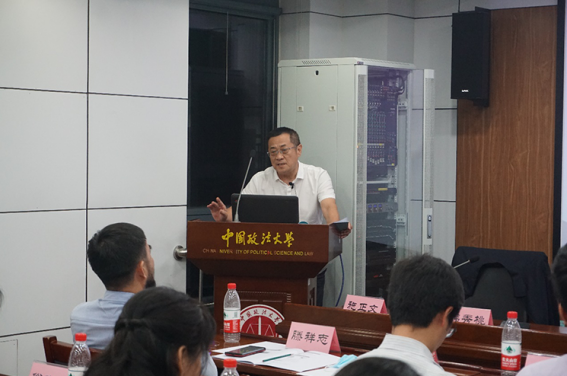
The picture shows the comments of lawyer Wang Jiaben
After the keynote speech of the second unit, Chen Shuangzhuan, director of the editorial department of "Taxation Research" magazine, Wang Jiaben, legal advisor of the State Administration of Taxation and senior partner of Beijing Tianchi Juntai Law Firm, deputy director of the Taxation Professional Committee of the Beijing Lawyers Association, Wu Jinmei, a lawyer at Beijing Yingke Law Firm, and Li Hui, a lecturer at the School of Civil and Commercial Economics at China University of Political Science and Law and director of the Tax Law Clinic, made wonderful comments based on the speeches in this unit. Among them, lawyer Wang Jiaben believed based on his own agency cases that conflicts between civil law and tax law have always existed, and it is necessary to establish basic rules for resolving conflicts between tax law and civil law, and to resolve them through legislation, legislative interpretation, and judicial interpretation. He believes that in the relationship between civil law and tax law, the two can be inconsistent. Some rules should be inconsistent and cannot be consistent. The inconsistency between civil law and tax law should be respected.
At about 23:00 p.m., the first issue of "China Tax Law and Tax Lawyer Salon" ended successfully. With the theme of "Civil Code and Tax Law", this issue of the Salon fully and in-depth discussed the basic relationship between Civil Code and Tax Law, the coordination of several important systems of Civil Code and Tax Law, and the impact of Civil Code on lawyers' tax-related business. It is of great significance for the tax service industry to thoroughly study and implement the Civil Code, correctly handle the relationship between civil law and tax law, and improve the level of tax-related legal services.
The "China Tax Law and Tax Lawyer Salon" is another useful attempt to deepen the connection between tax law theory and practice. It will be held from time to time in the future, taking advantage of the salon's flexibility and timeliness, and selecting the latest fiscal and taxation legislation and policy documents, the latest fiscal and taxation cases, and tax-related services. We will conduct in-depth special discussions on cutting-edge and difficult issues such as new business and new trends to further promote the construction of the rule of law in finance and taxation and deepen fiscal and taxation reforms, improve the theoretical level and professional quality of the tax-related service personnel, and continue to lead the innovative development of my country's tax-related service industry in the new era!





